Like many in my generation, I’ve been worried about global warming since I was young. I was introduced to the concept as a college student in the early 90s, years before climate change began making daily headlines.
Today the scale and severity of the climate problem is clear and much discussed. I’ve lately been on a reading kick about our ability to diffuse global warming, gobbling up both deeply pessimistic perspectives (“7 Reasons America Will Fail on Climate Change”) as well as considerably more hopeful ones (“7 Reasons America Should Succeed on Climate Change”).
Americans’ emotional and intellectual responses to the sobering news coming from climate scientists ranges from the irrational/cynical (“CO2 is plant food, so burning a bunch of coal will create a lush future, cheer up everyone!”) to the resolute (“buck up everyone, we can do something about this problem!”) to the fatalistic (“don’t fool yourselves everyone, get ready to burn.”)
I’m firmly in the middle camp. We face very big challenges, but I think there’s a reasonable chance that we will mount a significant reponse to those challenges and that through a combination of economic, technological, and cultural shifts we can decouple ourselves from carbon and create a livable future for our grandchildren.
This hope is fueled by two facts: 1. Concern for climate change has finally become widespread and mainstream, 2. We’ve just begun to direct human ingenuity and will to addressing the problem. I’m also encouraged by recent developments, like plummeting renewable energy prices, huge investments in next generation battery technology by the likes of Bill Gates and Eion Musk, the bilateral carbon agreement between the US and China, and technologies like Passive House that revolutionize energy efficiency.
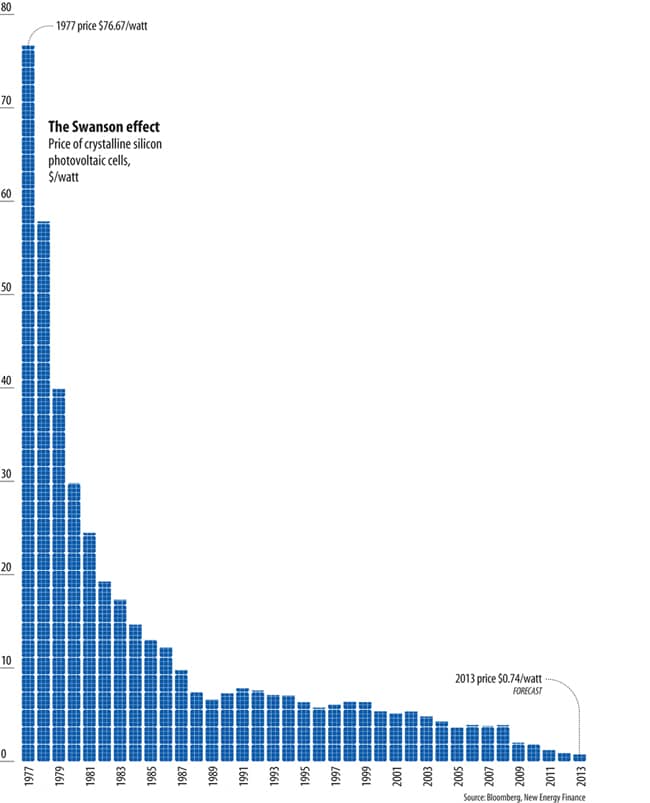
Price of solar cells has dropped by 99% since 1977. Source: Bloomberg, New Energy Finance
Still, some of my brothers and sisters in the community of the climate-concerned are more pessimistic. Some believe that the problems are too intractable and that we’ll burn all the fossil fuels currently buried in the Earth, triggering truly catastrophic warming. For them, doing “climate friendly” things like super-efficient building is not about contributing to a climate solution but rather about “fighting the good fight” – a moral act rather than a practical one. While the dark future they imagine is certainly a possibility, their predictions about our inability to make a difference are, by definition, based on hunches rather than fact.
It’s not fait accompli.
If you take a look at the psychology of all of this, maybe it should come as no surprise that a segment of the climate-concerned would lose hope early on in our climate struggle. We are, after all, a community of people self-selected for our predilection for alarm: the anxious watchers who alert the herd to danger. This watcher role is an important one, but the emotional traits that come with it can blind us to hopeful data as we focus on the scary stuff. I’d argue that as “watchers” we climate-concerned are biased toward pessimism when presented with potential solutions to the climate mess. So I think a dose of self-awareness is in order. We are right to warn of the danger, but saying “we’re doomed” is getting carried away. It speaks more to our psychology than to the facts.
We’re only doomed if we do not act.
As Bullitt Foundation president Denis Hayes pointed out at the Living Future conference a couple weeks ago, pessimism has no survival value. To the degree that pessimism breeds inaction, it’s maladaptive. And to the degree that it’s contagious, it becomes dangerous to our future. Ironically, pessimism about our ability to address climate change plays right into the hands of those lobbying for climate inaction; the climate defeatists and the climate deniers meet at the far edge of the circle of climate politics.
I was reminded of all of this at the PHnw6 Passive House conference three weeks ago – a great event, full of actionable information for the Passive House practitioner. But one of the keynote speakers – Steve Hallett of Purdue’s horticulture program – provoked the audience with a particularly dark vision of our climate future in a talk structured around a series of bleak axioms. One was his assertion that we will burn all of the available fossil fuels buried in the earth.
Predicting that outcome with any certainty is, shall we say, “bold.” It ignores the very real possibility that we can get our collective act together before then…but consider what would happen if he were right. According to an estimate by Michael Greenstone of the University of Chicago, burning all our planet’s fossil fuels would bring 16.2 degrees (F) of warming, utterly transforming our planet. Mind blowing, really. There’s got to be some version of the classic supply/demand curve that charts the likelihood of action against the severity of the consequences of inaction, something like the one on the right:
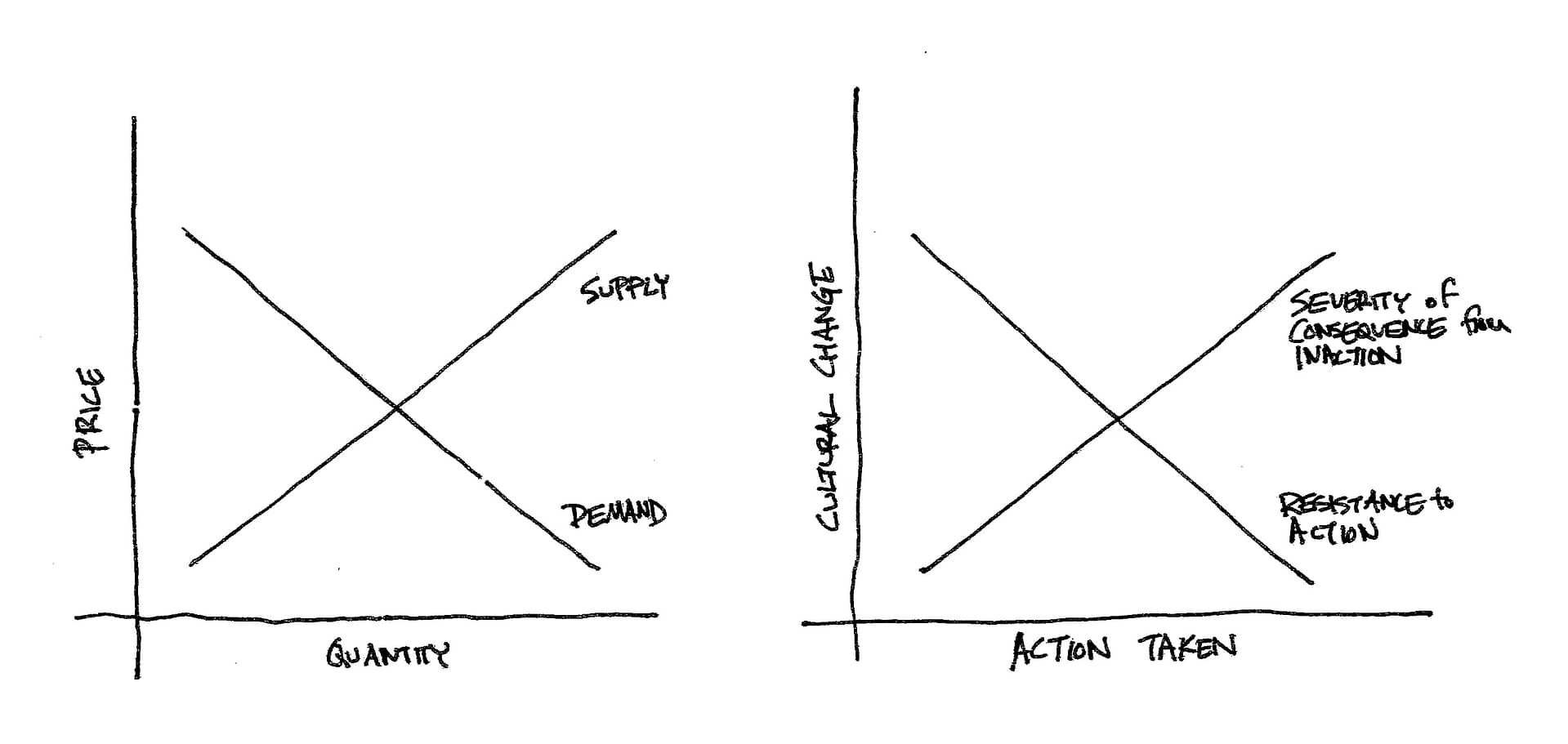
I don’t buy that we as a people cannot rally together to avoid burning it all. No guarantees that we’ll be successful, but we stand a chance. Plenty of Serious People point out that we have the tools (both economic and technological) to secure a livable future if we decide we really want one:
- “Renewable Electricity Futures Study” by National Renewable Energy Laboratory
- “Solving Global Warming – Not Easy, But Not Too Hard” by Dana Nuccitelli, Skeptical Science
- “7 Reasons America Should Succeed On Climate Change” by Joe Romm, Think Progress
Yes, we need to alert the world to the threat, but also to the practical solutions that are at our fingertips.
But crap. What if those solutions are just wishful thinking? Cue the next, more pernicious axiom from Hallett, one that you’d expect to be fairly explosive in a room full of designers and builders of super-efficient buildings: “Increased energy efficiency causes greater energy consumption, not less.” So…low-carbon Passive House projects will speed climate change, not slow it!
Sounds crazy, right? Well, it’s based on a theory called the “Jevons Paradox.” English economist WS Jevons came up with the idea back in 1865 when he observed that a new, more efficient steam engine was actually driving increased consumption of coal rather than the expected decreased consumption. The reason? Because the new engines used less coal, the price of producing a unit of work with coal dropped, thereby increasing demand for more and more steam engines and therefore big increases in coal consumption.
But, if efficiency actually causes consumption, then what’s the point of what we’re doing as builders of super-efficient buildings? Yeah, we’re delivering health and comfort to building occupants. And these buildings are resilient places, so you could set up survivalist camps in them to weather the Apocalypse, perhaps. But, Jevons, you’re telling me that all my green building good intentions are actually going to hasten climate change??
Wow, what a huge bummer.
So counter-intuitive. (Suspiciously so.)
How did we in the audience react to this message from the keynoter? With dissent and a demand for data to prove this existential threat to the foundations of super-efficient building? No, we’re much too polite. In fact, some of us bought the message, at least initially, accepting that the energy efficiency of our buildings leads to greater use of energy (through huge houses, perhaps, or greater wealth throughout society), and concluding that maybe what we’re doing has no positive impact on the climate.
But wait! We’re a smart and skeptical bunch. We love numbers. We know that correlation does not prove causation. What about the data? Where’s the proof? Isn’t it a little early to accept the Jevons Paradox as fact?
Let’s quickly examine the microeconomic and macroeconomic arguments made to argue that the Jevons Paradox is real…
At the microeconomic scale, the double-wide refrigerator is the favorite example cited by Jevons Paradox theorists. Fridges have never been more energy efficient than they are today, but they’ve also never been bigger. Energy efficiency therefore causes increases in fridge size, making that efficiency counterproductive, right?

Double-wide fridge image courtesy of Birdies100, found here.
Perhaps. But if correlation proved causation then I’d have some alarming news to share about the effect of Miss America’s age on the rate of murders by steam, hot vapors, and hot objects, two very highly correlated sets of data! (correlation coefficient of 0.870127)
Seriously, look at this graph from the folks at Spurious Correlations:
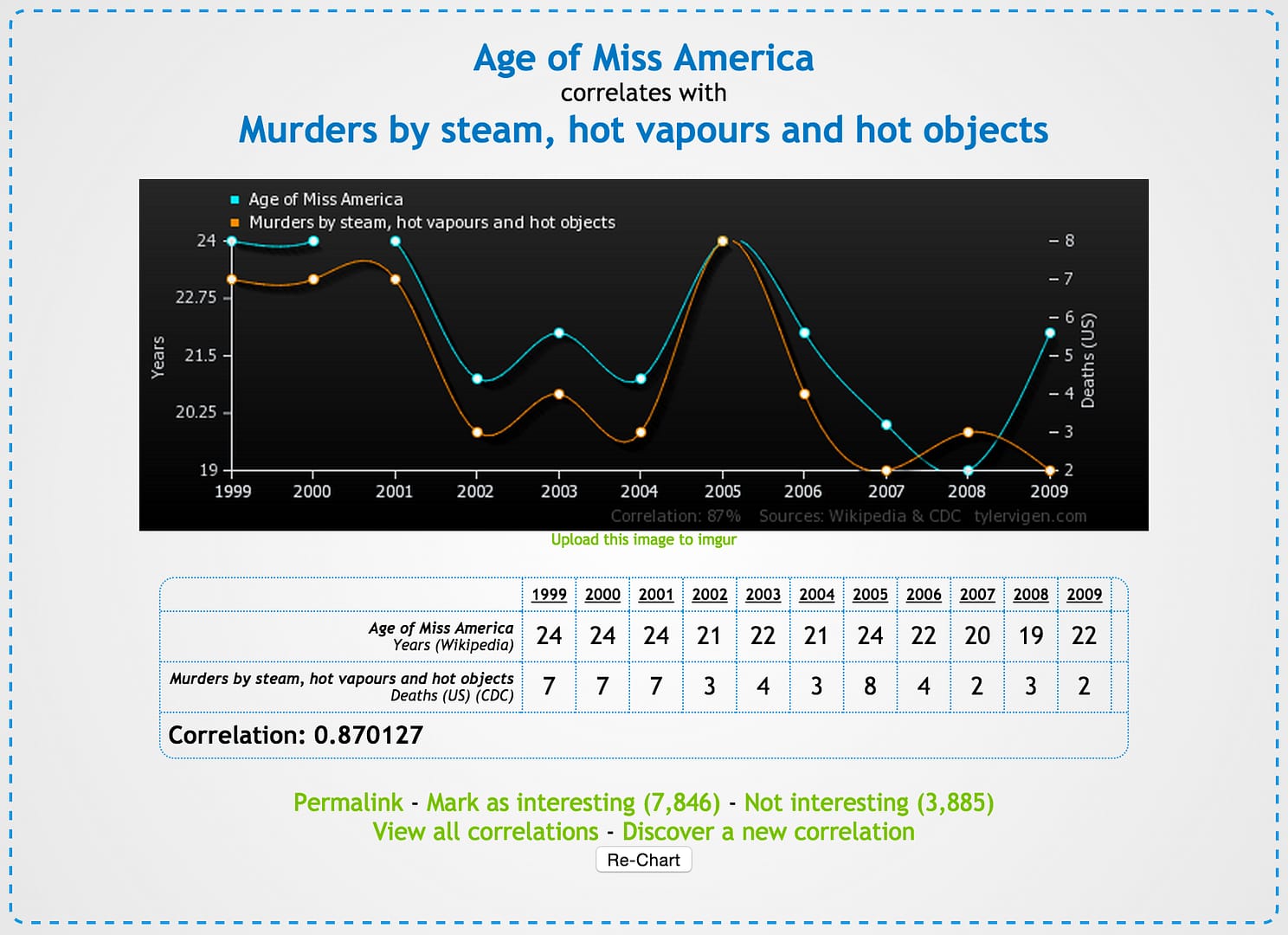
So let’s take a closer looks at the fridges. First, I ask you, would people really be buying double-wide fridges now because they are energy efficient? (If the Jevons Paradox applies to fridge size, then energy efficiency causes increases in fridge size.) I’d argue that a far more likely driver of double-wides is affluence and big kitchens. But let’s look at the data, this from David Goldstein of NRDC:
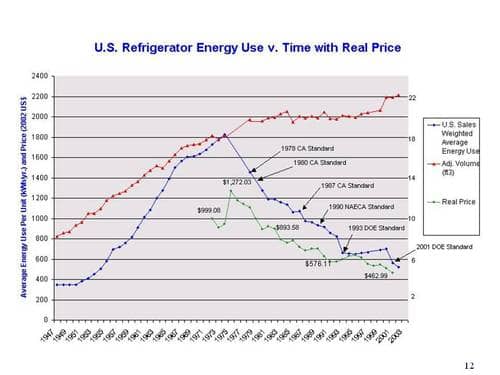
It shows that expansion of fridge size (the red line) slowed significantly just as energy efficiency began to improve after 1972. No proof of Jevons here. Perhaps the opposite.
Okay, so let’s move up to the macroeconomic scale, the current refuge for the Jevons Paradox theory. Macroeconomics is so much more complex than microeconomics that it’s inherently murkier. The argument for Jevons here is that the savings from energy efficiency make societies richer, which increases energy consumption. Proponents of this line of thinking point out that three hundred years ago we were heating buildings with inefficient wood fires and lighting them with candles. Today we have highly efficient furnaces, LED lights, and hybrid cars, but we consume way more energy per capita now than we did three centuries ago. Jevons proponents claim that efficiency drives the affluence that leads to higher consumption.
Perhaps, but again, correlation does not prove causation. Here’s more shocking news: per capita consumption of chicken is highly correlated with US crude oil imports (correlation coefficient of 0.899899):
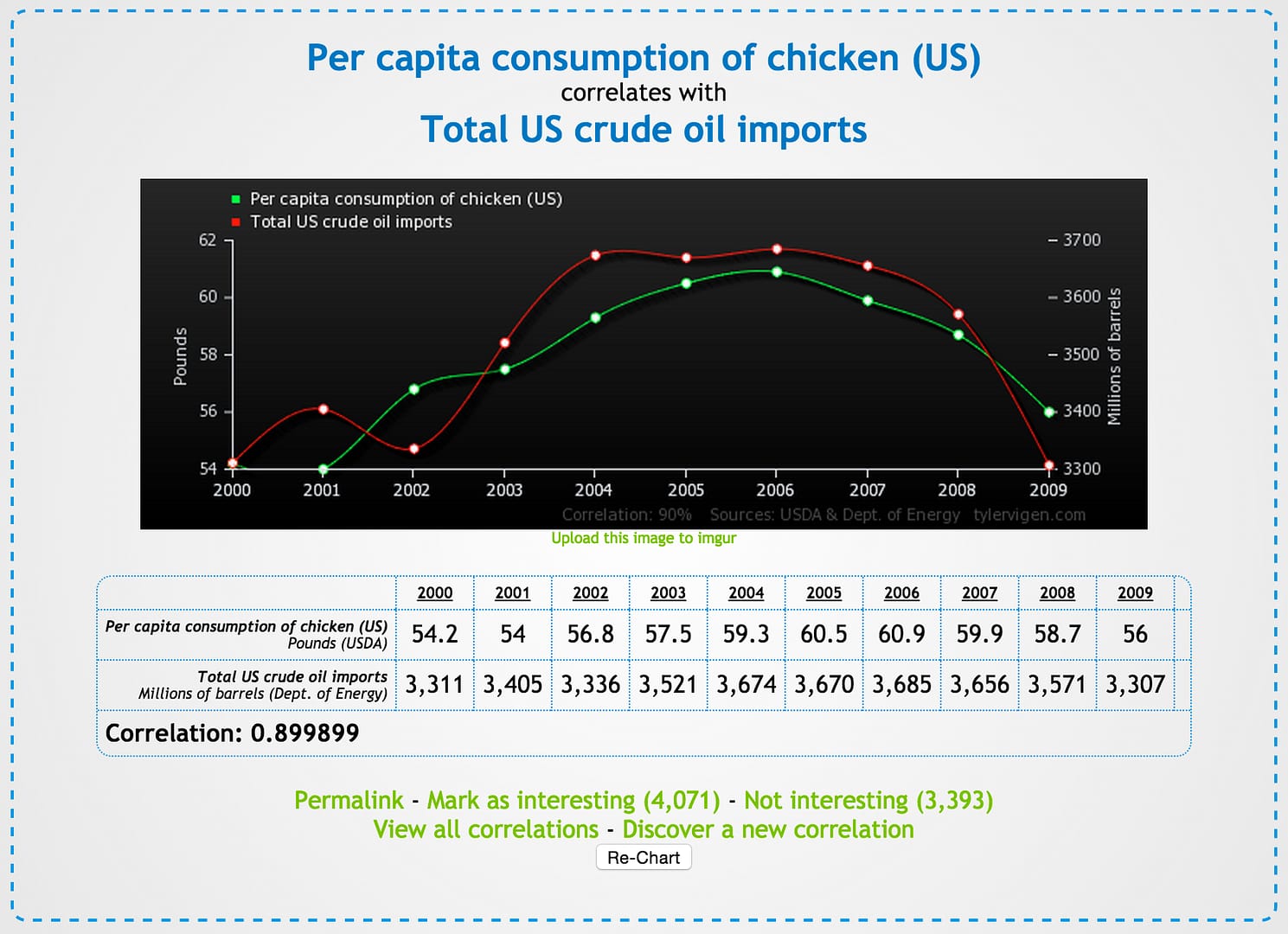
Granted, affluence almost certainly leads to increased energy consumption, but is energy efficiency the main driver of affluence? That seems like a real stretch. Does efficiency really cause greater consumption? What does the data show?
Take a look at these two graphs, again from Goldstein at NRDC…
California energy savings from efficiency measures:
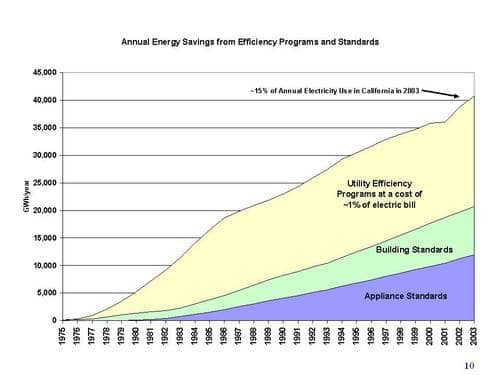
California per capita electricity consumption:
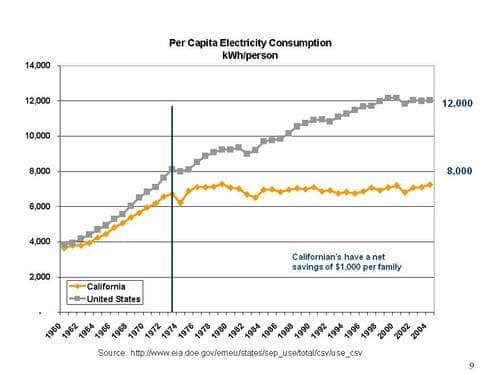
If Jevons applied here, California’s efficiency gains would have backfired, driving greater per capita consumption. Instead, we see that upward trend of per capita consumption was halted in its tracks in California while the rest of the country’s per capita consumption continued to increase dramatically.
This is not to say that smaller “rebound effects” don’t exist in the realm of energy efficiency. Economists universally agree that they do. A fuel-efficient Prius will save you money on gas and some small portion of that savings might bankroll extra driving. Combine that with other extra consumption that carries with it embedded energy costs and you’re left with a rebound of, say, 10-30%. But that means that 70-90% of the efficiency improvements of the Prius still “stick.” That’s far from the negative “backfire” posited by the Jevons Paradox.
An Energy Journal survey of the research finds a rebound effect of between 10-30% for efficiency measures in the residential and transportation sectors, and 0-20% for industries, making overall efficiency measures 70-100% effective.
David Owen, author of the New Yorker article, “The Efficiency Dilemma”, quotes the late Lee Schipper, physicist and energy efficiency scholar at Stanford University, as saying that the Jevons Paradox only exists in outlier cases:
“The key to understanding Jevons is that processes, products, and activities where energy is a very high part of the cost – in this country, a few metals, a few chemicals, air travel – are the only ones whose variable cost is very sensitive to energy. That’s it.”
Still, there are some economists who theorize, based on correlative data and economic modeling, that the Jevons Paradox could be at work at the macroeconomic scale. The most vociferous of them are with the “eco-modernist think tank” Breakthrough Initiative. They like the Jevons Paradox because it plays into the Institute’s pro-nuke, pro-gas, anti-carbon tax, anti-regulation platform and helps them argue that energy conservation is a waste of time and resources. (It’s an understatement to say that the realm of Jevons research is highly politicized.) But even if the Jevons Paradox does have an effect at the macroeconomic scale (meaning overall increases in the energy efficiency of society lead to greater energy consumption), a simple green tax (like a carbon tax) would wipe out the effect.
My point, two days after Earth Day 2015, is that we should be as wary of believing what climate defeatists say as we are of what the deniers say. Even if they’re our close friends. The conclusion that there is no hope for us in our climate crisis is specious. And while the arguments against hope, like the Jevons Paradox theory, do possess a certain bleak allure, the validity of those arguments should be approached with as much skepticism as we apply to the Pollyanna arguments posited by climate deniers.
The reality is that energy conservation, like the revolutionary performance of Passive House, does make a difference. Renewable energy does too. Are there rebounds or intermittency challenges? Yeah. Do we need to place a price on carbon to make serious headway at keeping fossil fuels in the ground? Yeah. But there are real, credible solutions out there – economic, technological, cultural and political solutions.
For those of you still reading, I’ll conclude with these words from leading climate scientist Michael Mann, as quoted by Joe Romm of Climate Progress:
“Defeatist framing is not helpful and threatens serving as self-fulfilling prophecy. We all grew up reading the ‘The Little Engine that Could,’ not ‘The Little Engine that Couldn’t.’ The only real obstacle to averting dangerous climate change is lack of willpower and imagination.”
P.S. For some of the best climate-related writing and thinking on the web, do check out Joe Romm’s work at Climate Progress. It’s good stuff – a sober look at both the severity of the climate crisis and the possibilities for meaningful climate action.
And in case you haven’t watched this video yet, it’s well worth a view:
https://youtu.be/pN2WI5KqJDY
Sunset over Earth image by NASA, found here.



